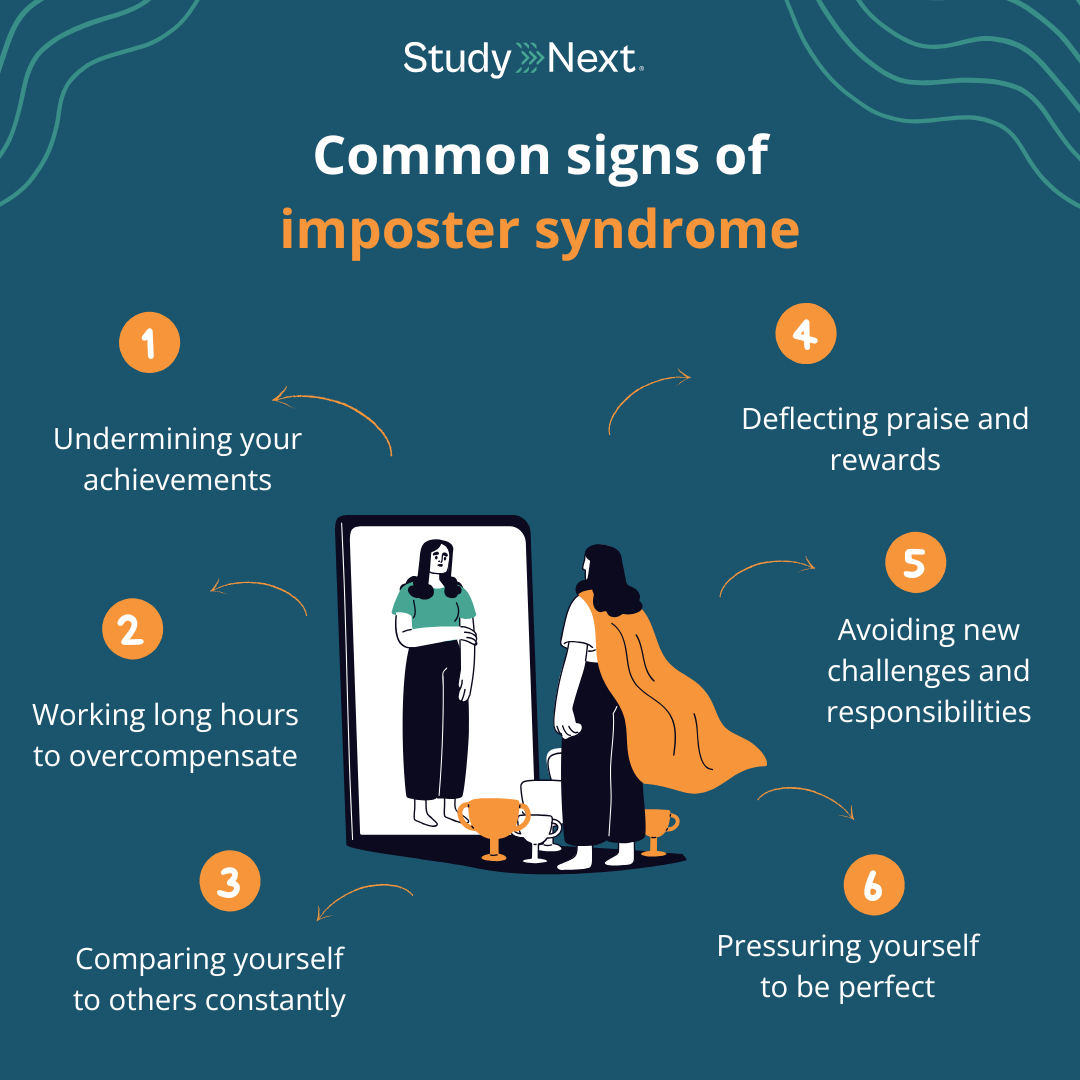In This Article
- What is imposter syndrome?
- How common is imposter syndrome?
- How to overcome imposter syndrome: an expert’s take
- How organisations can support leaders with imposter syndrome
- Impact of imposter syndrome on leaders
- Can imposter syndrome be a good thing?
- How postgraduate study can help build your confidence in leadership
- Boost your leadership skills with a postgraduate course

Self-doubt is a common experience for many leaders at various stages of their careers, especially when they’re entrusted with high-level responsibilities and are under constant pressure to deliver results that drive the business forward. However, when self-doubt becomes persistent and overwhelming, it may lead to feelings of inadequacy that can affect their wellbeing and performance.
This article delves into the definition of imposter syndrome and the typical signs to look for. You’ll also learn how to overcome imposter syndrome at work as a leader, with recommendations from a leadership expert, and explore how postgraduate education can help you build greater confidence in your capabilities.
What is imposter syndrome?
Imposter syndrome refers to a psychological experience where you feel inadequate and undeserving of success despite your past achievements. Instead of recognising your skills, you may attribute your accomplishments to luck, timing or other factors outside of your control. These feelings of self-doubt are often accompanied by a fear of being exposed by others as a fake.
To address this oftentimes uncomfortable feeling, it’s essential to understand what causes imposter syndrome. In the workplace, feelings of self-doubt and inadequacy can arise from many sources, such as having high expectations tied to your role, being given responsibilities outside of your comfort zone, stepping into unfamiliar environments as a new employee or constantly being compared to other colleagues. Over time, these factors can make you question your own capabilities, diminishing your confidence.
How common is imposter syndrome?
Imposter syndrome can happen to anyone, regardless of their experience level or professional achievements. This phenomenon is also prevalent in Australia, with SEEK reporting that 52 per cent of Australians have felt it at some point in their lives. In the workplace, 57 per cent of women and 47 per cent of men reported feelings of imposter syndrome in their professional roles. Natalie Waters, founder at Elevate Coaching, is a leadership and career coach whose expertise lies in guiding aspiring, new and seasoned leaders to build their confidence and leverage their strengths. In her experience working with chief executive officers (CEO) and other C-suite executives, she finds that imposter syndrome is extremely common, even for leaders. As she shares, “It is experienced probably more than people realise, especially when new leaders take on roles that come with higher responsibilities than they’re used to.”
Common signs of imposter syndrome
Imposter syndrome can manifest in various ways. For example, you may sit in a meeting and feel like you have nothing to contribute. As Natalie shares, “It’s that moment when you feel you’re not enough, that you don’t belong there in that room – especially when surrounded by people who seem more experienced.”
Other regular indicators of imposter syndrome include the following:

As a leader, recognising when you’re experiencing imposter syndrome is the first step towards addressing it and moving past it swiftly. “Every leader experiences it,” Natalie explains. “What matters is how fast you can move from that self doubt, into a mindset that’s confident and empowering.”
How to overcome imposter syndrome: an expert’s take
According to Natalie, some strategies that can help you overcome imposter syndrome include documenting your wins, reframing your perspective, simulating confrontational situations and seeking support from peers, mentors and experienced staff. She also stresses the importance of being curious and asking questions, embracing the fact that you don’t need to know everything and saying yes to opportunities that come your way. If you’ve just stepped into a leadership role, it’s essential to give yourself time to adjust to your new environment.
Find out more below:
Document your wins
When you’re dealing with imposter syndrome, it’s easy to dismiss your achievements. To change your perspective and combat your inner critic, you can document each win in the workplace. Having a tangible record of your wins can serve as a concrete reminder that you do have the skills to lead effectively, especially when self-doubt creeps in.
Natalie encourages leaders to track their wins, regardless of how small they are. “Over time, it builds a solid record you can look back on, helping to challenge self-doubt.” she explains. Building up your wins consistently eventually creates a track record of not just your skills and efforts, but your progress as well. These small wins can shift the focus away from the pressure to be perfect all the time, which is a common sign of imposter syndrome, and highlight how true competence often comes from continuous learning and growth.
Documenting small wins encourages you to celebrate each success, rather than just major milestones as a leader. This mindset helps you stay motivated and focused, even when results don’t go as planned.
Reframe your mindset
Imposter syndrome often has less to do with your actual capabilities and more to do with how you interpret them. It’s important to catch yourself quickly when you start feeling insecure in your role and reframe those distorted thoughts with more positive and realistic interpretations. Natalie advises that whenever you think you’re not ready or you don’t belong, you need to remind yourself of your unique strengths and experience to reframe your mindset.
“You’re not in that leadership role by accident. You were chosen for your skills, experience and knowledge.”
One effective way to help restructure your negative self-perception is by practising simple mantras. Natalie shares that when you say “I’m capable”, it can remind you that you have the skills to lead a team. Saying “I’m prepared” helps to reinforce that you’re ready to face any challenge. Declaring “I can make a difference” can anchor you to the purpose of your work. When repeated consistently, these positive self-affirmations can reshape your inner dialogue into one that’s more supportive and constructive.
Natalie also highlights that good leaders can reframe their mindset quickly from thinking “I don’t know what I’m doing” to “I can do this and I’ll find a way”. She believes that if you keep thinking that you can’t do something because you don’t have enough experience or you’ve never been in this situation before, then you’ll never be able to move past it. However, if you flip that narrative to remind yourself that you’re extending your comfort zone as a learning experience, then you’ll be able to move past your self-doubt. As Natalie shares, “What you focus on is what you get.”
Simulate confrontational situations
Leadership often comes with challenging situations, especially when it involves performance management or delivering tough feedback. A large part of imposter syndrome in leadership can derive from the uncertainty of what will happen and fearing that others will find out you’re incompetent at managing people. Natalie recommends practicing difficult or confrontational scenarios ahead of time to feel better prepared. She says, "Confidence comes from preparation.”
Simulating confrontational scenarios beforehand can help you come up with different strategies so you can navigate conversations effectively. Rather than focusing on “what ifs” and imagining the worst possible outcomes, rehearsing can help make the unknown more manageable by creating scripts to help you prepare for what may happen. This gives you more control and confidence to handle difficult situations with professionalism. Successfully navigating these challenging conversations can then become another win to counter feelings of inadequacy.
Seek support from peers, mentors and experienced employees
Being a leader means having high visibility in the workplace. When you’re in charge of leading teams and projects, you may feel the pressure to always appear competent and avoid letting others witness your struggles, which are common signs of imposter syndrome. Natalie warns that the more you bottle up your problems and isolate yourself, the greater the likelihood that your work performance will be affected.
Learning how to get over imposter syndrome as a leader can take time, but seeking support from others can make a big difference. To get out of that isolating mindset, Natalie encourages reaching out to peers and mentors for guidance. They can offer you insights and advice, whether it’s telling you to go easy on yourself or recommending that you spend some time in another department or a different business unit to help you understand the bigger picture. She also believes that mentors can guide you through tough decisions. When you've got something that you might be deliberating over, a mentor can provide perspective or reassurance and direction.” Mentors often have more experience at work, allowing you to learn practical strategies to navigate complex business challenges from them.
It’s also important to lean on long-tenured employees. Natalie says that working with these individuals, whether they’re a part of your team or are your peers, allows you to leverage their experience in the business. By building strong relationships with them, you can gain valuable insights into what has worked well in the past, which mistakes to avoid and understand the organisation’s culture better.
When you experience imposter syndrome, it’s easy to magnify your perceived shortcomings. Support networks can provide objective feedback about your strengths and progress. This external validation can help counter any distorted self-criticism you may have. Opening up about your struggles can also demonstrate that it’s common for leaders to experience self-doubt. When you encourage a culture that normalises asking for support, it shows that vulnerability is part of leadership and isn’t a flaw.
Be curious and ask questions
Leaders sometimes feel they need to know everything, and when they inevitably don’t, it can lead to frustration. One practical way to shift this mindset is by leaning into curiosity and lifelong learning. When you continuously seek information, you accept and promote the idea of learning as part of growth, which is a strength rather than a weakness.
Natalie shares how she navigates her own imposter syndrome in her career by demonstrating curiosity. “When I feel as though I’m the less experienced person in the room, I always reframe that thought very quickly by often asking a question.”She extends this advice to the CEOs and C-suite leaders she works with, who also sometimes feel they are less prepared or experienced than others. She says when you ask questions, it gets you out of your own head and puts you back in the room. Rather than hiding knowledge gaps and being afraid of being called out, asking questions and encouraging dialogue help transform these gaps into learning opportunities.
Accept that it’s okay not to know all the answers
When you’re a leader, you’re often expected to provide solutions to challenges at work. However, you may also feel the pressure to find the perfect solution right away, which can spark self-doubt and make you feel like an imposter. This is why it’s essential for you to acknowledge that it’s alright not to know everything. Accepting this uncertainty can reduce your stress and release the pressure to be perfect all the time.
Natalie believes that the best leaders are people who can admit to their team overtly that they don’t have all the answers. Instead of just giving directions, these leaders focus on working through the situation together as a team and leveraging each member’s skill set and knowledge to achieve shared goals. This approach not only encourages open communication within the team but also fosters a sense of shared ownership over challenges and solutions. It shows that leadership is more about guiding a team towards success than having all the answers.
Remember your strengths
Leaders who experience imposter syndrome tend to focus on their perceived flaws. This makes them feel as though their successes are flukes. According to Natalie, self-doubt can make you overlook the skills and experiences that initially helped you secure your leadership role. “When you have imposter syndrome, you often forget the experience that you’ve got, what your strengths are, what the interviewer liked about you or how you got that promotion.”
Remembering your strengths can be a powerful way to counter negative self-talk. By regularly reflecting on your past achievements and attributing them to your own skills, you can boost your confidence. Your successes serve as proof of your capability, showcasing the value you bring not only to your team but also to the organisation as a whole. Being aware of your strengths can prevent you from overthinking and allow you to navigate high-pressure and complex business challenges with confidence.
Focusing on your strengths is also vital for leaders who are advancing their careers at a rapid pace across various roles and organisations. When placed in a new environment, it’s easy to feel like you don’t belong, which can make you feel like an imposter. Natalie advises tapping into the self-belief and confidence that motivates you to keep progressing in your career. It’s the same confidence that has driven you to make bold career moves and excel during interviews. At the same time, don’t be afraid to ask others to help remind you of your strengths. Natalie recommends getting perspectives from your coworkers and managers to remind you what you’re good at. This external validation, along with reflecting on what you’ve done well in the past, can help clear your self-doubt.
Say yes to opportunities
Imposter syndrome often leads people to decline opportunities because they feel unqualified. Natalie cautions that rejecting opportunities out of fear only passes them to the next person. Instead, consistently saying yes to opportunities and then finding a way to make them work can help counter feelings of imposter syndrome. By willingly stepping into challenges, even when you feel uncertain, you give yourself a chance to prove your capabilities to yourself. Each time you succeed at a task, it builds your confidence that you can handle new responsibilities.
Natalie also believes that seizing an opportunity can lead you to many others. “When you say yes to one opportunity, it takes you through a door. On the other side of that door – there will be ten other doors that you never knew existed. These are ten ‘other opportunities’ that may never have come your way. That was just through saying yes that first time.” As a leader, it’s especially crucial for you to keep taking on opportunities that come your way, as they often lead you to more experiences and connections. This momentum creates a pathway of continuous growth and professional development, helping you advance further in your career.
Give yourself time
If you’re new to your leadership journey, it’s important to take the time to familiarise yourself with your new role and environment as there are understandably many things you don’t know yet. According to Natalie, self-confidence comes with time. She recommends that while you settle in, you should work towards growing your network with the people within the organisation, explore beyond your own business unit and even possibly seek out a mentor or leadership coach that can help you determine where your strengths are so you can really capitalise on them. The more experience you gain in your job, the more confident you become, which can greatly counter any self-doubt thoughts you have.
How organisations can support leaders with imposter syndrome
Organisations can provide support for leaders who are facing imposter syndrome by normalising growth conversations, offering peer support and building a culture of psychological safety. Leaders are often expected to drive business growth, but without the right assistance, imposter syndrome can undermine their confidence and effectiveness. Providing the appropriate support ensures leaders can focus on achieving organisational goals without sacrificing their wellbeing.
Companies can help leaders navigate their roles by conducting growth conversations on a regular basis. These discussions offer a structured space for you to clarify expectations, get feedback and explore opportunities for development. When you understand how you’re adding value to the organisation, you can feel more confident to lead teams and projects, helping to reduce feelings of uncertainty that come with imposter syndrome.
If you just stepped into a leadership role, it can feel daunting to have new responsibilities and expectations. Natalie highlights the importance of peer support during this stage. Having a peer check in regularly creates a safe space for you to share your thoughts, doubts and challenges rather than keeping everything to yourself and potentially feeling like you don’t belong. Peers can offer practical insights and advice based on their personal experience to help you make better decisions and gain more confidence in your abilities.
Organisations should also strive towards creating a culture of psychological safety where leaders are encouraged to open up about their uncertainties and mistakes and ask questions. Natalie explains that promoting open communication helps organisations instil confidence that you can raise any issues you encounter. “For an organisation to have an ‘open door policy’, allows team members to feel safe to discuss some of the challenges that they may face without judgment.” This culture ensures that admitting knowledge gaps is accepted and respected, which reduces the fear of being seen as incompetent.
Impact of imposter syndrome on leaders
Imposter syndrome can undermine your leadership capabilities by causing you to doubt your decisions, which not only erodes your confidence as a leader but also affects your team. Learn more below:
Strategic thinking and decision-making
Leaders are frequently expected to develop and deliver the best business solutions, but these high expectations can trigger self-doubt. Natalie points out that this often leads to hesitation. “When leaders feel that imposter syndrome kick in, they may overanalyse and therefore delay making decisions.” This analysis paralysis, which typically stems from a fear of making the wrong call, often prevents you from taking decisive action.
When you keep hesitating, you may lose confidence in your own judgment. According to Natalie, this may cause you to defer to others unnecessarily for their guidance. She says when you rely too heavily on others, it can stifle your growth as a leader. It also further fuels your self-doubt as you’re not able to make decisions yourself.
Team performance and morale
Imposter syndrome doesn’t just affect you as an individual. When self-doubt engulfs your decision-making processes, it inevitably affects your team. Natalie shares that leaders who doubt themselves can unintentionally cause uncertainty within the team. “If you second-guess your decisions and avoid taking clear stances, your team might feel hesitant themselves or lack direction.”
Natalie also warns that when you step into a leadership role in a team with existing bad behaviour, self-doubt can cause you to overlook or tolerate that behaviour. As a leader, you have the responsibility to manage and inspire your team to accomplish shared goals, which requires a certain level of assertiveness to act as the guiding light. However, if you’re not confident in your leadership abilities, then it may cause team members to push against your boundaries and conduct themselves in ways that wouldn’t normally be tolerated.
Ultimately, when team members lack certainty about their roles and bad behaviour isn’t held accountable, it can bring down team morale and productivity, affecting overall team performance.
Can imposter syndrome be a good thing?
While imposter syndrome is generally treated as a negative psychological experience, it can also be a good reminder to learn and improve yourself. Natalie believes that feeling this way often signals that you’re on the verge of a significant growth spurt. “You’re just about to stretch your capability, expand your experience or possibly add another skill set.”
Rather than treating feelings of imposter syndrome as a limitation, you can reframe them to motivate you in embracing challenges, developing new skills and stepping into opportunities that boost your confidence. Imposter syndrome, while oftentimes uncomfortable, can serve as a catalyst for professional growth and self-improvement.
How postgraduate study can help build your confidence in leadership
Pursuing postgraduate study can help develop your confidence by equipping you with the right skills and knowledge to thrive as a leader. These programs offer you a structured learning experience to deepen your understanding of effective leadership frameworks to navigate today’s business challenges. You can also develop core leadership skills like strategic thinking, decision-making and team management during your studies. Refining your leadership expertise with advanced study can reinforce your sense of self-worth, helping you feel more secure as a leader.
For example, the Graduate Certificate in Responsible Leadership course at Curtin University is suitable for leaders at all stages. With Corporate Strategy and Responsible Leadership as core units, this course also provides you with the option to either complete an internship or a risk management project. The final unit you take depends on your years of leadership experience. If you have less than three years of leadership experience, you’ll take the Fundamentals of Leadership unit, which explores the role of leaders in creating sustainable organisations. If you have three years or more of leadership experience, you’re required to take the Leadership in Crisis and Recovery unit, which focuses on developing responsible decision-making skills to navigate challenging situations and guide organisations through recovery.


This graduate certificate explores the importance of developing effective strategies and discusses the legal, managerial, and ethical issues that affect corporate governance.
You’ll immerse yourself in real-life scenarios and issues from various industries, including government, corporate, and community sectors, and formulate creative, sustainable solutions. You’ll also discover how to communicate persuasively and insightfully with diverse audiences, including corporate executives and board directors.
If you have less than three years of leadership experience, you’ll learn how to analyse leadership critically and unpack leaders' roles in building sustainable organisations. If you’re an experienced leader, you’ll explore how to make responsible decisions during periods of crisis and recovery.
CQUniversity offers an online Graduate Diploma of Leading Organisational Change, which focuses on developing your skills in innovation and sustainable business development, leadership and integrity, organisational change management, operations management and business analytics to help you drive success and optimise performance. This course is tailored for individuals planning to pursue a managerial role or those already working as managers.


As organisations face unprecedented change in their operating environments and markets, the demand for skilled and influential change leaders is growing. CQUniversity's Graduate Diploma of Leading Organisation Change will build your competencies in innovation and sustainable business development, leadership and integrity, organisational change management, operations management and business analytics to help you thrive and maximise performance.
In this course, you will develop an understanding of perspectives, frameworks and models relevant to influential leadership and change management, while expanding your ability to recommend practical innovation systems and programs for organisations to improve long-term sustainability.
Career opportunities are abundant as organisations around the world deal with rapidly changing environments. This course is specifically designed to suit individuals who are planning to work, or are already working, as managers.
During the course, you will study a blend of management and change leadership units. You will also have opportunities to engage with research and undertake reflective practice to contextualise and consolidate your learning.
Designed for current professionals, enjoy the flexibility to study part-time and online. You can also access recorded lectures at a time convenient to you.
Upon completion of the first four units, you will be eligible to satisfy the interim or exit award of the Graduate Certificate of Management. After completing this program, you will be eligible to proceed into the Master of Business Management with credit for eight units.
The Master of Business (Leadership) course at the University of Southern Queensland is designed to help you master the art of nurturing strong working relationships, leading high-performing teams and achieving business success. You’ll develop the necessary skills to confidently lead in any environment. Some core units in this course include Harnessing Human Capabilities for the Future of Work, Strategy, Innovation and Business Research as well as Data and Decision Making.


Specialising in Leadership within UniSQ’s Master of Business will help you become a leader who can manage competing tensions, ambiguous demands and energise teams. Use your skills to balance the competing tensions of organisational stakeholders, society and the environment.
Organisations of all sizes and in all sectors require leaders who are equipped with ethical adaptive leadership skills to communicate and guide their people through continual changes.
In Deakin University’s Master of Leadership, you’ll learn how to apply modern leadership theories, enhance team performance and make ethical business decisions. This course empowers you to drive change and work towards becoming a visionary leader, while providing you with industry-recognised credentials that validate your skills and experience.


The Deakin Master of Leadership equips you with the skills to thrive in dynamic environments. Learn to apply contemporary leadership theories, boost team performance, and make ethical decisions that drive success.
Gain industry-recognised credentials that validate your expertise, reflect on your achievements, and uncover growth opportunities.** This program empowers you to inspire change, take on larger roles, and shape the future as a confident and visionary leader.
The Master of Leadership course at the University of Notre Dame Australia combines a unique mix of class tutorials, mentoring, networking opportunities and engagement with guest lecturers. Besides developing your leadership capabilities, you’ll be able to expand your professional network and learn from experienced professionals on how to lead in today’s business world.


Available as a full-time program across 18 months (or the equivalent of part-time study), The Master of Leadership will provide you with the skills necessary to secure a leadership role in your chosen field, profession, or industry.
You will complete nine compulsory courses focusing on leadership, strategy and a project and have the option of specialisation in business, liberal arts or three general elective courses.
Each course is developed and offered by a team of respected leaders, combining a solid academic framework with strong commercial and industry experience in the degree program. The Master of Leadership program is a unique blend of class tutorials, networking, mentoring and interacting with guest lecturers.
Boost your leadership skills with a postgraduate course
To thrive as a leader in today’s business landscape, it’s essential to have confidence in your capabilities to inspire teams, manage resources and lead projects. When self-doubt creeps in, it’s important to negate these thoughts by reframing your perspective from fearing failure to embracing learning as part of growth. Advancing your studies can also boost your confidence as a leader, as you’ll gain the proper skills to progress in your role. Start your leadership development journey and explore diverse postgraduate courses in leadership offered by top Australian universities.





















